In 1095, Byzantine emperor Alexios Komnenos asked for help against the Turks. Within a year, Pope Urban II had used this request to exhort every able-bodied soldier in Christendom to make a pilgrimage to Jerusalem. By giving every crusader absolution from their sins, he’d gathered an impossible force to wage war on the Muslims and reconquer Jerusalem. By 1099, that pilgrimage was completed and the Crusaders left an unbelievable path of destruction in their wake. Worse, most of the soldiers just went home, leaving a token force to defend the Holy Land. Taking ground is only the first step in a war. Far more difficult is to hold it.
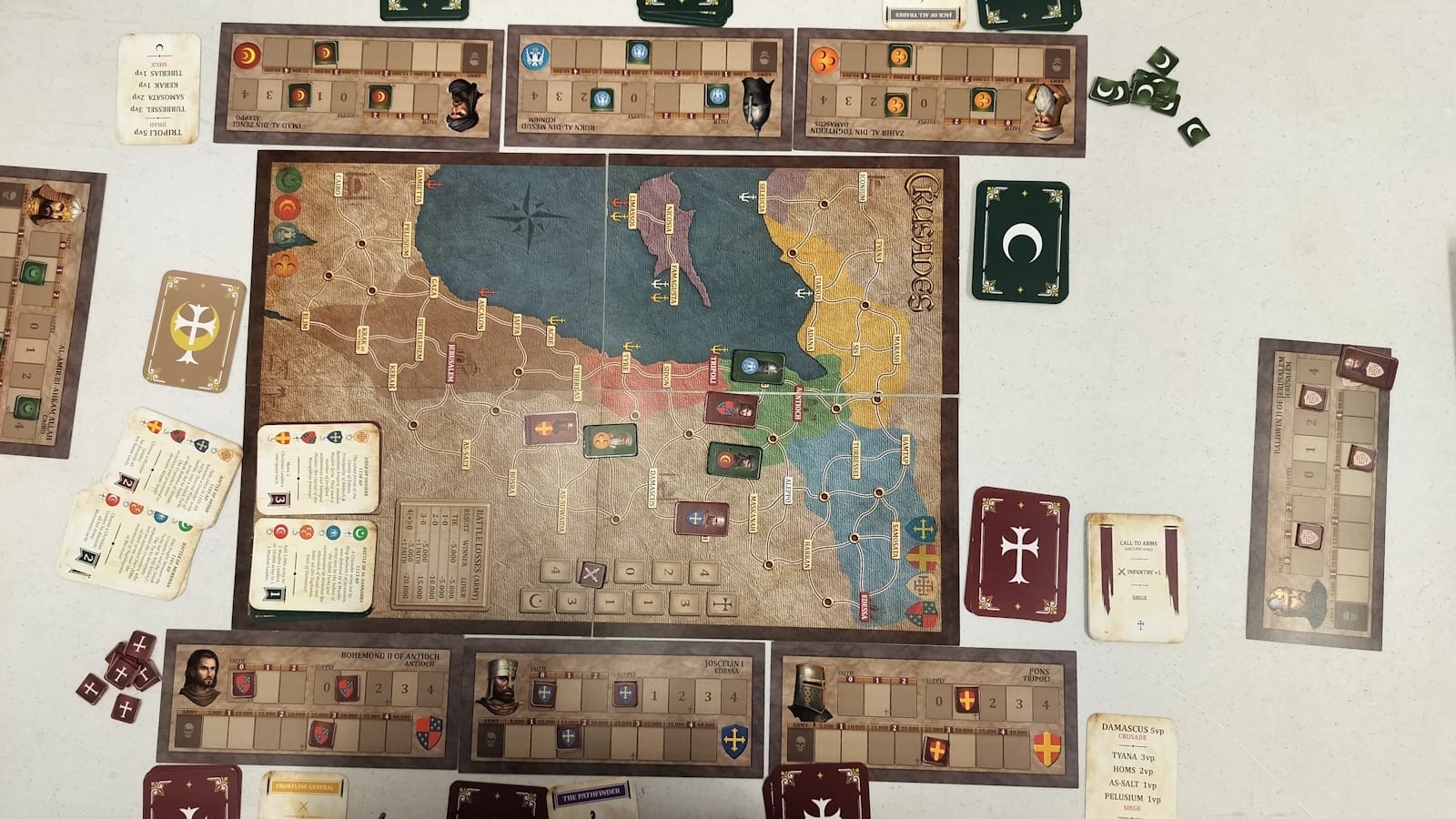
Crusades is a war-game for 2-6 players, re-enacting the events following the 1st Crusade. Many of the crusaders have left, and the Muslims have amassed their own armies to strike back. One team will play the Muslim forces while the other team will play the Christian crusaders. Each player gets a leader of their religious side, such as Bohemund II of Antioch for the crusaders, and Imad Al-Din Zengi on the side of the Muslims. Each leader has a different army with 3 types of army statistics. First and most impactful is the size of the army. The next is the army's faith, which also counts as a measure of additional power. The final stat that armies have is their supply. Supplies are used as a resource for using special abilities.
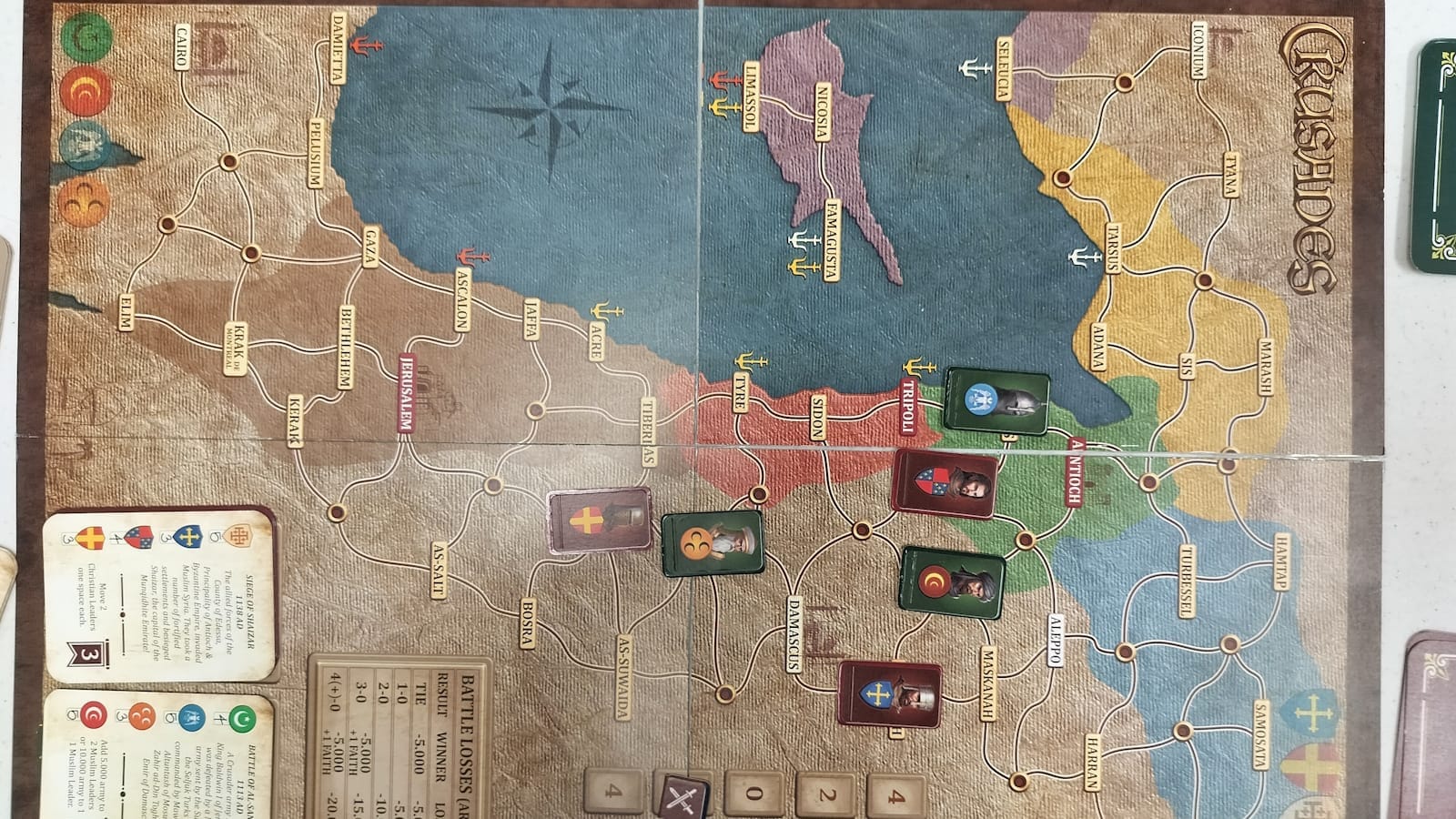
After divvying out the armies, players will get a list of objectives for their armies. Each city on the list earns that team some points, though that's not the only way to earn points. Another method is to take over cities from countries of Armenia and Byzantine. Whoever takes the most of those countries also gets a few points. Finally, the difference between victories of each battle. There's a little gauge on the side that you move towards your side after winning a battle (or the other way when you lose). If it ever gets to the fifth spot, that side wins immediately. Finally, whoever has an army closest to Jerusalem gets a bonus point.
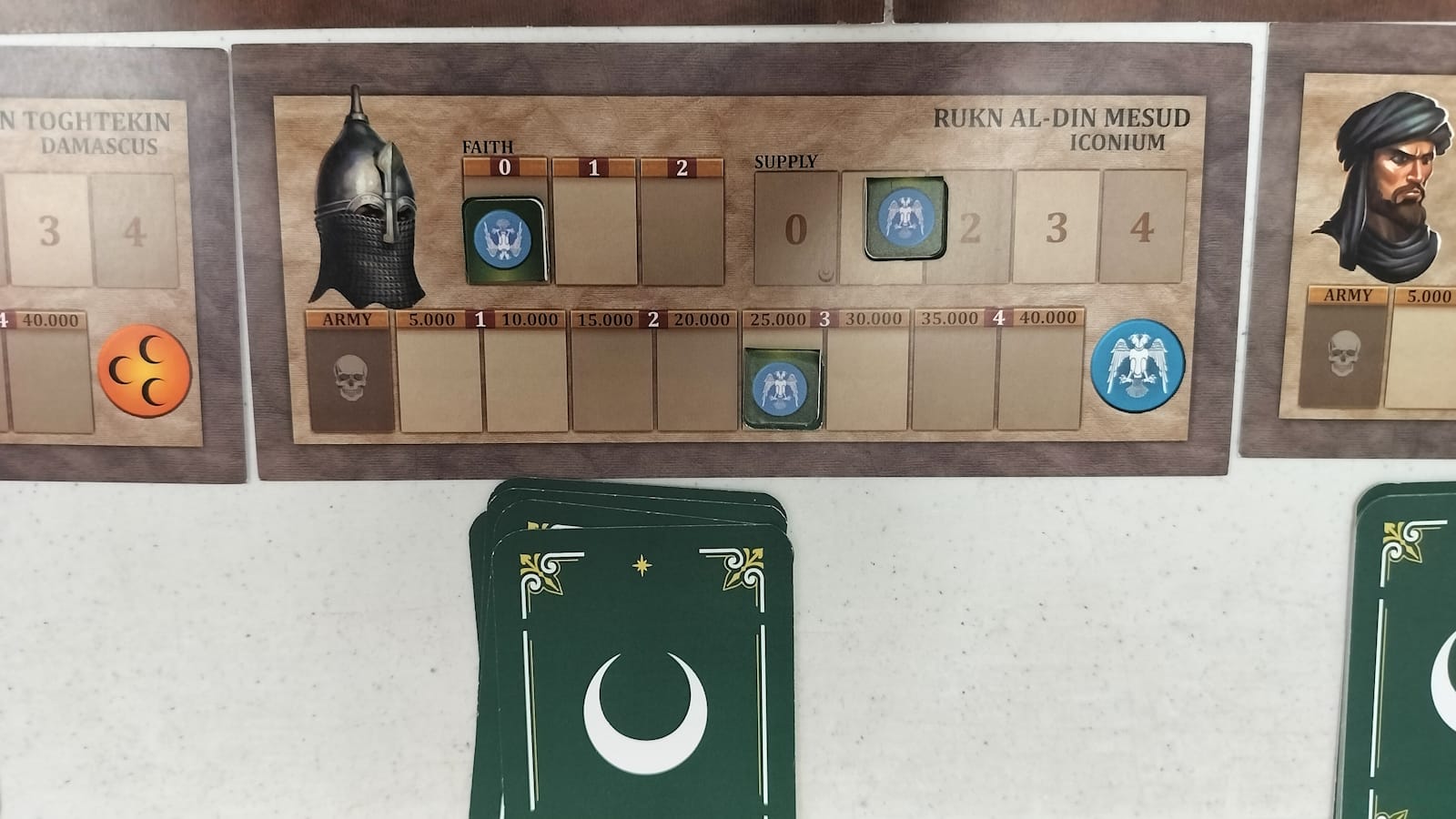
So how does one claim these cities and fight these battles? Well, that's what the primary mechanic of the game is for. Every round, an event card is drawn for each faction. Each event card shows the number of cards each leader gets, as well as providing bonuses for each side. Once each leader gets their cards, gameplay begins. Every card has 2 to 3 different actions on them. The actions range from moving an army, getting in fights, sieging cities, recruiting soldiers, and gathering supplies, as well as a few other, sneakier actions. Finally, most cards also have a bonus of some sort on them which can be used in battle to increase the strength of your army.
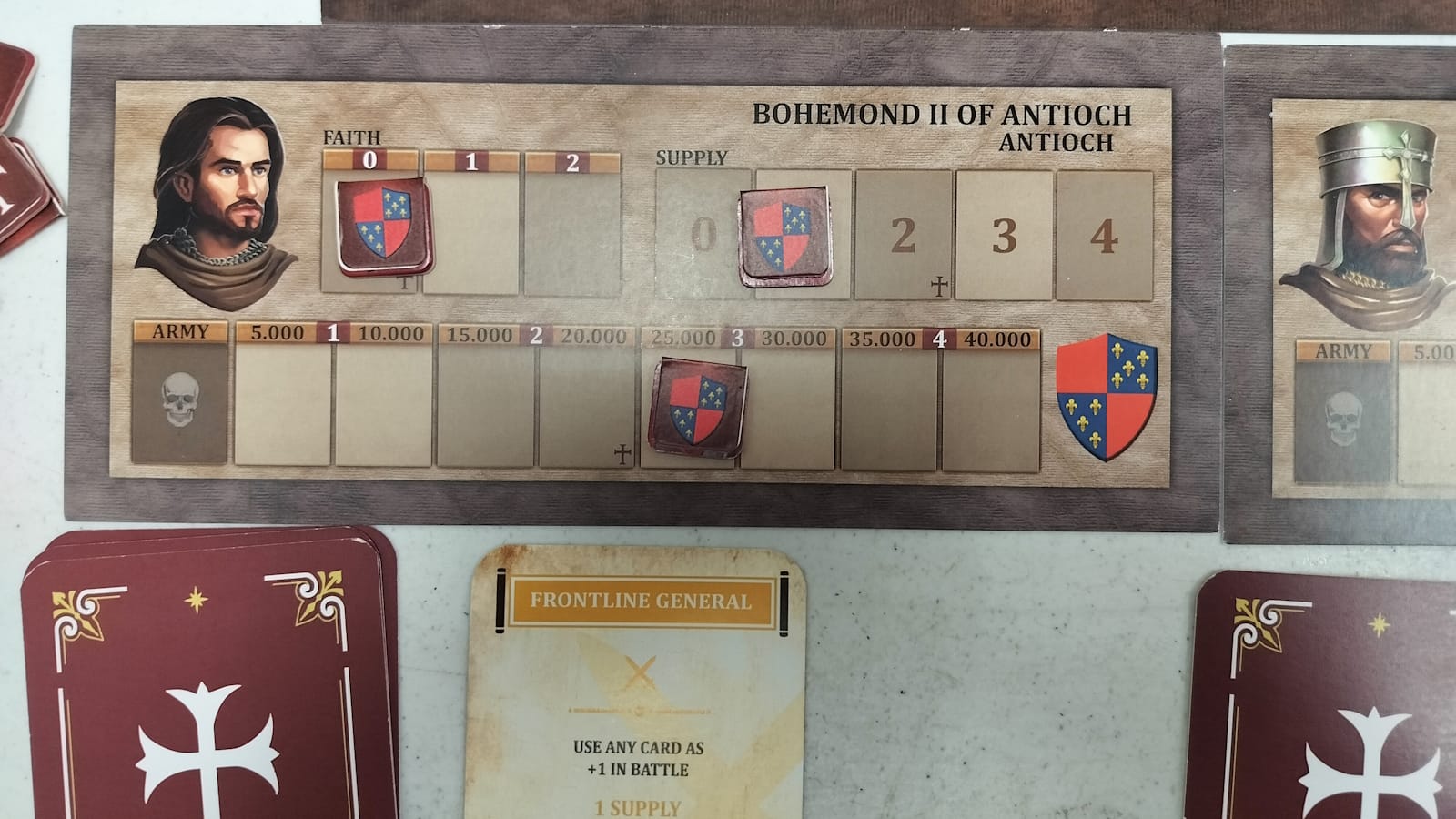
Each turn, any player on their team chooses a card and plays it, starting each round with the defending Muslim side. The other team then plays a card, and so on. Players don't have to play cards in any specific order otherwise. This leads to strategic plays where one player might need to race an opponent to a city, so the rest of the team goes on hold until that's done. Since each round's hands are relatively small (5 cards at the most) and cards can be burned quite quickly in battle, this doesn't leave players out of the action for too long.
Battles are quick to resolve as well. Once someone plays a battle card, the fight begins. This means that the attacking player will always be a card down by default, which is the only real penalty to the attacker. As a fight begins, each player adds up their combat bonuses. They get one for every 2 army size, 1 for every point of faith, and then a bonus based on the current event cards. Next, players can play cards that might change the battle, such as Sandstorm which prevents any other cards from being played, or other cards which will add additional power to the fight. Whoever has the most power wins the fight. The more one side beats the other, the larger the losses for the defeated. A large enough rout will result in increasing the faith of the victorious army, which means that the army doesn't just win, but gains a permanent and powerful bonus for it, while the defeated army must run away with their losses.
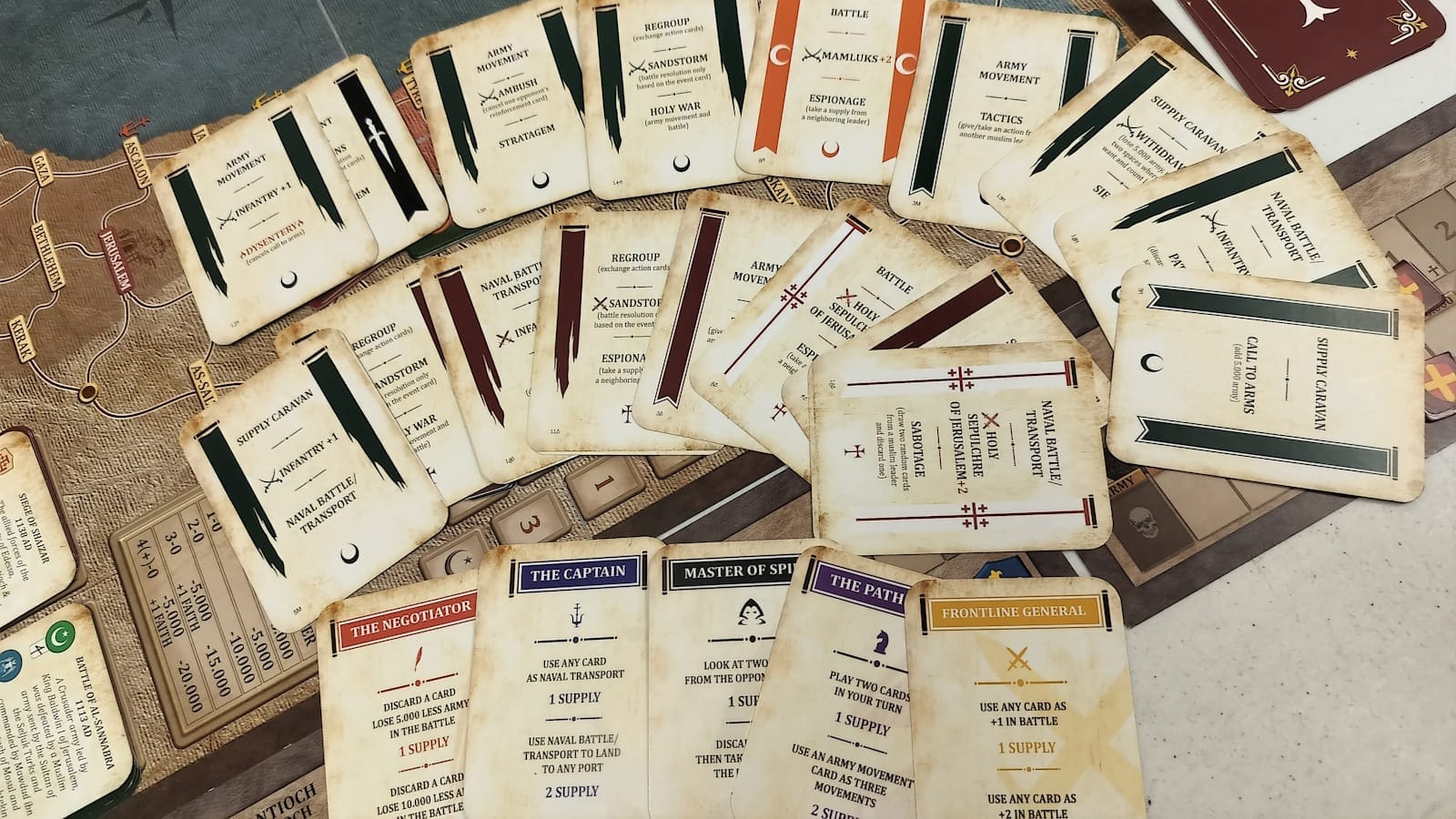
Players can also choose to play other cards like Supply Caravan or Call to Arms, which increase that army’s supply and size respectively. Other options are movement, which is done along lines drawn between cities, or sea transport, which can be done from one port to another of the same color. There are a few more offensive options that don’t require fighting, such as Dysentery, which can cancel an opponent’s Call to Arms, or Sabotage which will remove a card from the opponents’ hands, reducing their options. The most interesting might be the Strategem, which can be used to gain special Strategem powers for your leader, such as taking two actions in one turn, or reduce your losses in combat. Alternatively, a leader can use a Strategem action to swap out their army for reinforcements. This swaps in the 4th leader for their side, possibly saving one leader from certain doom, and bringing in fresh troops.
Crusades is an interesting game. It feels like it was made in the 80s to the point where I did some hunting to see if that was indeed the case. The throwback war game vibes are undoubtedly going to be exactly what some people are looking for. What we saw was a preview, so I'm sure it'll only get better and better as it gets more time to cook. If you’re interested in old-school war game vibes, then take a look at their Kickstarter, live now.





















